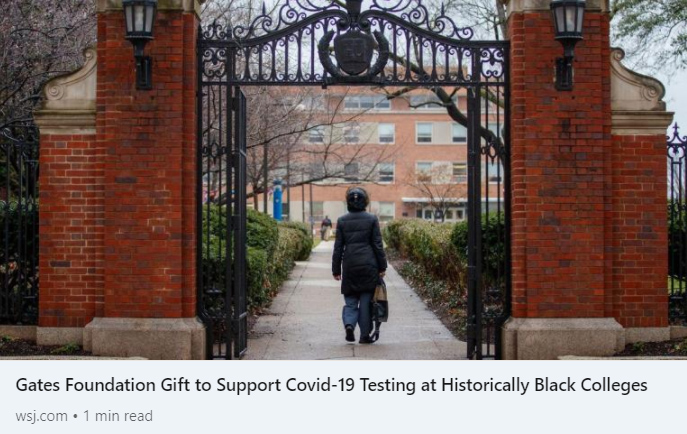Morehouse School of Medicine Shares in $15M Gates Foundation Investment to Expand COVID-19 Testing at HBCUs
School is one of six institutions serving as diagnostic centers in The Just Project
ATLANTA—Morehouse School of Medicine is one of six Historically Black Colleges and Universities to share in a three-year, $15 million investment by the Bill & Melinda Gates Foundation as part of its COVID-19 response, made in partnership with The Just Project, which aims to increase access to COVID-19 diagnostic testing for HBCU campuses and their communities.
The Just Project is ThermoFisher Scientific’s ambitious and historic partnership with HBCUs involving a multipronged effort to help address the coronavirus, which has disproportionately impacted communities of color. The project is establishing diagnostic testing hubs at colleges and universities, including equipment, additional test kits, and analytical labs to rapidly deploy and process COVID-19 tests. MSM is serving as one of those regional hub diagnostic centers, processing tests administered at multiple HBCUs.
The Gates Foundation investment, its largest donation to HBCUs to date, will support MSM and up to 10 participating HBCU medical, veterinary, pharmacy, and agriculture schools in this effort. The other initial institutions are Florida A&M University, Hampton University, Howard University, Meharry Medical College, and Xavier University of Louisiana,
“The Gates Foundation award is multidimensional in its reach and impact,” said Sandra Harris-Hooker, PhD, MSM vice president and executive vice dean, Research and Academic Affairs. “First it allows us to safely return our students to campus. Next, it provides the opportunity for us to hire skilled laboratory technicians, strengthening the workforce during this very challenging economic time. And lastly, MSM along with each hub institution now has the capacity to extend our reach beyond the communities we traditionally serve into our neighboring cities and states.”
The vaccine will not be considered effective if it does not enroll enough diverse persons to understand whether or not they’re achieving the benefit.” It is important to acknowledge that Black people have been mistreated in medical trials in the past, but now, “we’re on the NIH panels, we’re at the FDA, we’re in the rooms where decisions are being made.”
Dr. Valerie Montgomery Rice


